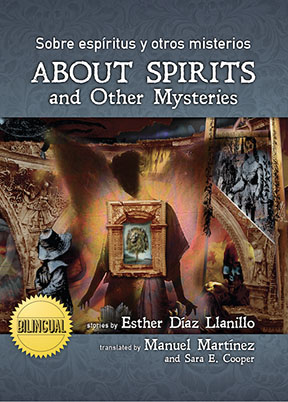Support Cubanabooks
To support Cubanabooks, visit our page at North Valley Community Foundation.

Author: Esther Díaz Llanillo
Translator(s): Manuel Martínez and Sara E. Cooper
ISBN: 978-1-944176-10-5
Summary
Díaz Llanillo is known for her blending of paranormal fantasy with black humor and metaphysical undertones; her short fiction has been described as bizarre, uncanny, absurd, macabre, intellectual and ironic. Her work explores universal questions of right and wrong, good and evil, real and unreal. The tales in this collection are set in the city of Havana, although to enter her fiction is to cross a frontier into strange spaces and imaginary worlds. Díaz Llanillo takes everyday scenes of Cuban life, rotates them on the axis of her imagination, then reveals the hallucinations, ghosts, dreams, and supernatural forces that lie beneath the surface.
Blurbs & Reviews
"An intriguing, chilling collection that demands introspection from its readers... Llanillo’s bilingual short stories explore the spiritual, macabre, and mundane." --Kirkus Review
"These stories show a profound understanding of how we are both imprisoned and freed by the myriad and complex layers of our own imaginations. Combining horror and humor, reality and fantasy, sympathy and rigorous observation, Llanillo creates characters that are deeply changed by their experiences. As are we, from reading them." —Nancy Kress, Hugo and Nebula Award-winning author of the Beggars in Spain series
"About Spirits and Other Mysteries/ Sobre espíritus y otros misterios reveals Díaz-Llanillo’s kinship with Kafka and Borges, with whom she shares a propensity toward allegory and metaphysics conveyed in parables characterized by temporal play. Like Silvina Ocampo, Piñera, Cortázar and Rosario Ferré, she evinces a dark and quite cynical sense of humor. The bilingual edition is essential to fill vacuums in Cuban literary history, an exceptional book worthy of serious perusal by any scholar of Cuban literature." —Jorge Febles, Professor Emeritus, University of North Florida
"Stories where the inexplicable and supernatural can coexist withhumor… This Cubanabooks edition is ample enough, that with its critical and explanatory texts readers will be able to reach a nuanced, rich, and complete picture of Díaz-Llanillo’s oeuvre." —José Miguel Sardiñas Fernández, Universidad Autónoma de San Luis Potosí, México
"Here is the true voice and sublime style of Esther Díaz Llanillo, tales of fantasy with hints of life lessons. Thanks to the excellent translation, readers of English will now know her work, replete as it is with erudition, masterful language, inherent Cubanidad, and a few ghosts…" --Mirta Yáñez, Premio Nacional de la Literatura Cubana
"Esther Díaz Llanillo’s stories transport us to a world of contained spaces where the universal and the fantastic merge in a subtle lyricism. Somewhere between philosophical treatise and supernatural fiction, these tales convey the ambiguities of the human condition with bluntness and wit. Martinez’s crisp translation does justice to the unique style of one of Cuba’s most original writers." --Raúl Rosales Herrera, Drew University
"Where have these fantastic stories been all my life? The fact that some of these stories are a half-century old but only now available in English is mind-boggling. With translations that capture the crisp, often conversational style of the original, Manuel Martínez has done a great service in conjuring for Anglophone readers the spirit and the mystery of one of Cuba’s major literary figures." –Jeremy Glazier, Ohio Dominican University
Click here for reviews, articles, and author's words from Cuba (in Spanish)
Sneak Peeks
---
Tracing the decades-long trajectory of Llanillo’s writing, About Spirits & Other Mysteries gives a representative sample from the six major story collections published before her demise. The 53 stories included in this volume come from El Castigo (1966), Antes y después del sueño (1999), Cambio de vida (2002), Entre latidos (2005), Los rostros (2008), and El vendedor de cabezas (2009). The book also contains a foreword from the author’s daughter, Dr. Raquel Pérez Díaz; a translator’s note by Manuel Martínez; and an analytical essay by the main English-language editors, Sara E. Cooper y Maria di Francesco, translated from Spanish by the principal Spanish-language editor, Daniel Díaz Mantilla.